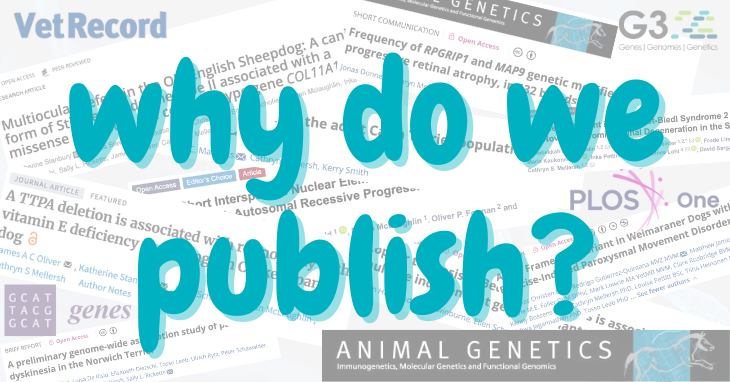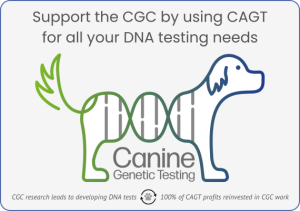
The Canine Genetics Centre (CGC) is enormously proud of its publication record. Since the year 2000 the CGC team members have published well over 100 peer-reviewed papers, the majority in open-access scientific journals with global readership. However we are often asked “why publish our results and give away our secrets”, so this week we are going to answer that very question.
How does the peer-review process work and why is it so important?
When we submit a paper to a scientific journal for peer-review, the manuscript is shared with at least two, and frequently more experts in the field, who agree to review the paper anonymously. They review all aspects of the paper, ranging from the study design, data analysis and conclusions drawn, to whether the study met with appropriate ethical approval and whether the written English is up to scratch. Those reviewers then return their reports to the journal, which can either accept or decline the paper immediately, or as often happens, they can request specific changes that must be made to the paper before it can be published. The review process is frequently iterative, with a paper sometimes going through several rounds of review before it appears in print and it is not unusual for there to be in excess of six months between submission and publication.
And that is why the CGC is proud to announce each of our new publications, because each one represents the completion of a piece of research that has sometimes taken several years to complete, that has been judged worthy of publication by anonymous experts in the field.
But because the peer-review process is so rigorous, it is one of the major yardsticks by which researchers are measured and funding bodies frequently take into account a researcher’s publication record before awarding grant funding – not surprisingly they might have reservations about awarding funding to a researcher who does not publish their results very often.
Most of the research that the CGC undertakes is funded by charitable organisations and grass roots stakeholders, so we believe it is especially important that we publish the results of our research, so that these supporters can see exactly what their donations are being used for.
 The CGC operates its own canine genetic testing service, Canine Genetic Testing (www.CAGT.co.uk), and the vast majority of the DNA tests that CAGT offers are based on peer-reviewed, published data, and this applies to tests based on mutations identified by the CGC as well as by researchers at other institutions. Moreover, for each DNA test we offer we signpost customers to the relevant publications on which the DNA test is based – these can be found under the ‘Additional Information’ section on each test’s web page. Not every DNA testing laboratory does this – in fact, most do not – but at the CGC we believe passionately our customers should have access to the science behind the tests that we offer.
The CGC operates its own canine genetic testing service, Canine Genetic Testing (www.CAGT.co.uk), and the vast majority of the DNA tests that CAGT offers are based on peer-reviewed, published data, and this applies to tests based on mutations identified by the CGC as well as by researchers at other institutions. Moreover, for each DNA test we offer we signpost customers to the relevant publications on which the DNA test is based – these can be found under the ‘Additional Information’ section on each test’s web page. Not every DNA testing laboratory does this – in fact, most do not – but at the CGC we believe passionately our customers should have access to the science behind the tests that we offer.

